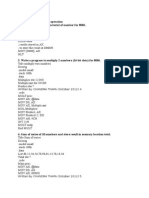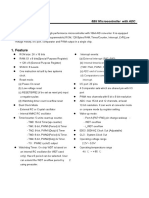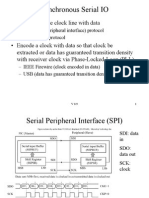0 ratings0% found this document useful (0 votes)
23 viewsLecture #04, Microprocessor Lab
This document describes a lab experiment to write an assembly language program that reads a number and checks whether it is odd or even or prime. It includes the algorithm, flowchart, programming code, and a sample output. The program uses macros to read a number from the user, print strings, and checks the number for even/odd/prime status using division and modulo operations. It then prints the appropriate response string based on the results.
Uploaded by
sksozibsaikatCopyright
© © All Rights Reserved
We take content rights seriously. If you suspect this is your content, claim it here.
Available Formats
Download as PDF, TXT or read online on Scribd
0 ratings0% found this document useful (0 votes)
23 viewsLecture #04, Microprocessor Lab
This document describes a lab experiment to write an assembly language program that reads a number and checks whether it is odd or even or prime. It includes the algorithm, flowchart, programming code, and a sample output. The program uses macros to read a number from the user, print strings, and checks the number for even/odd/prime status using division and modulo operations. It then prints the appropriate response string based on the results.
Uploaded by
sksozibsaikatCopyright
© © All Rights Reserved
We take content rights seriously. If you suspect this is your content, claim it here.
Available Formats
Download as PDF, TXT or read online on Scribd
You are on page 1/ 7
EEE-3104: Microprocessor and Interfacing Lab
Dept. of Electrical and Electronic Engineering
University of Dhaka
Prof. Sazzad M.S. Imran, PhD
sazzadmsi.webnode.com
&
Dr. Sakhawat Hussain
Lab Experiment #02 (Part-1)
Name of the Experiment: Write and execute an assembly language program that reads a
number and checks whether it is odd or even or prime.
Algorithm of the Program:
Write algorithm of the program by yourself.
Flowchart of the Algorithm:
Draw flowchart of the algorithm by yourself.
Lab Experiment #02 (Part-1)
Programming Code:
readnum macro num
mov ah, 01h
int 21h
sub al, ‘0’
mov bh, 0ah
mul bh ;axal×bh
mov num, al
mov ah, 01h
int 21h
sub al, ‘0’
add num, al
endm
printstring macro msg
mov ah, 09h
mov dx, offset msg
int 21h
endm
Lab Experiment #02 (Part-1)
Programming Code:
_DATA segment
cr equ 0dh
lf equ 0ah
msg1 db ‘Enter number <XX>: ’, ‘$’
msg2 db cr, lf, ‘Even number.’, ‘$’
msg3 db cr, lf, ‘Odd number.’, ‘$’
msg4 db cr, lf, ‘Prime number.’, ‘$’
msg5 db cr, lf, ‘Not prime number.’, ‘$’
num db ?
_DATA ends
Lab Experiment #02 (Part-1)
Programming Code:
_CODE segment
assume cs: _CODE, ds: _DATA
start: mov ax, _DATA
mov ds, ax
printstring msg1
readnum num
mov ah, 00
mov al, num
mov bl, 02
div bl ;alax/bl, ahax%bl
mov bh, 00
mov bl, al
cmp ah, 00
je evennum
printstring msg3
jmp checkprime
evennum: printstring msg2
Lab Experiment #02 (Part-1)
Programming Code:
checkprime: and dx, 00
mov ah, 00
mov al, num
cmp al, 01
jle notprime
cmp al, 02
je isprime
mov ch, 00
mov cl, 02
chkprm2: div cx ;axdx:ax/cx, dxdx:ax%cx
cmp dx, 00
je notprime
and dx, 00
mov ah, 00
mov al, num
inc cx
cmp bx, cx
jge chkprm2
Lab Experiment #02 (Part-1)
Programming Code:
isprime: printstring msg4
jmp skip
notprime: printstring msg5
skip: mov ah, 4ch
mov al, 00h
int 21h
_CODE ends
end start
Sample Output:
Enter number <XX>: 43 Enter number <XX>: 34
Odd number. Even number.
Prime number. Not prime number.
Enter number <XX>: 02 Enter number <XX>: 27
Even number. Odd number.
Prime number. Not prime number.
You might also like
- Aim: Write A Program Which Sets The Parity Bit. CodeNo ratings yetAim: Write A Program Which Sets The Parity Bit. Code18 pages
- Software Programs: Part A 1. Design and Develop An Assembly Language Program To Search A Key Element "X" in A List of N' 16-Bit Numbers. Adopt Binary Search Algorithm in Your Program For SearchingNo ratings yetSoftware Programs: Part A 1. Design and Develop An Assembly Language Program To Search A Key Element "X" in A List of N' 16-Bit Numbers. Adopt Binary Search Algorithm in Your Program For Searching21 pages
- Laboratory Manual: Department of Mechanical Engineering Faculty of EngineeringNo ratings yetLaboratory Manual: Department of Mechanical Engineering Faculty of Engineering24 pages
- 18CSL48 Microcontroller and Embedded Systems LaboratoryNo ratings yet18CSL48 Microcontroller and Embedded Systems Laboratory27 pages
- Microprocessor and Microcontroller: Soft Ware Programs-Part ANo ratings yetMicroprocessor and Microcontroller: Soft Ware Programs-Part A21 pages
- Microprocessor & Microcontroller Laboratory Manual 4Th Semester Ise Subject Code: 15Csl48No ratings yetMicroprocessor & Microcontroller Laboratory Manual 4Th Semester Ise Subject Code: 15Csl4873 pages
- factorial...1sec count ....pack to unpack bcdNo ratings yetfactorial...1sec count ....pack to unpack bcd8 pages
- Course Code: EEE-318. Course Title: Microprocessor and InterNo ratings yetCourse Code: EEE-318. Course Title: Microprocessor and Inter2 pages
- Updated microcontroller-lab-EC-606 - RemovedNo ratings yetUpdated microcontroller-lab-EC-606 - Removed25 pages
- Microprocessor & Microcontroller Lab 2021No ratings yetMicroprocessor & Microcontroller Lab 202125 pages
- Micro-Processor and Assembly Language: Lab Assignment#7No ratings yetMicro-Processor and Assembly Language: Lab Assignment#77 pages
- Ee8681-Microprocessor and Microcontroller Laboratory-1667857924-Ee8681 Lab Manual-NewNo ratings yetEe8681-Microprocessor and Microcontroller Laboratory-1667857924-Ee8681 Lab Manual-New107 pages
- Learn Digital and Microprocessor Techniques On Your Smartphone: Portable Learning, Reference and Revision Tools.From EverandLearn Digital and Microprocessor Techniques On Your Smartphone: Portable Learning, Reference and Revision Tools.No ratings yet
- 8.3 Stack Organization: Stack: A Storage Device That StoresNo ratings yet8.3 Stack Organization: Stack: A Storage Device That Stores25 pages
- General Description: 8bit M Icrocontroller With ADCNo ratings yetGeneral Description: 8bit M Icrocontroller With ADC50 pages
- Setting Up A GCC - Eclipse Toolchain For STM32F746No ratings yetSetting Up A GCC - Eclipse Toolchain For STM32F74611 pages
- What Are The Different Motherboard Components and Their Functions PDF100% (1)What Are The Different Motherboard Components and Their Functions PDF4 pages
- Subject: Service Communication: 160: Unit Life Optimized Settings (ULOS)No ratings yetSubject: Service Communication: 160: Unit Life Optimized Settings (ULOS)9 pages
- Synchronous Serial IO: - Send A Separate Clock Line With DataNo ratings yetSynchronous Serial IO: - Send A Separate Clock Line With Data42 pages
- Make An Impact: Brother Ink Tank PrintersNo ratings yetMake An Impact: Brother Ink Tank Printers4 pages
- Gmail - Concentrix - Online Assessment - Login DetailsNo ratings yetGmail - Concentrix - Online Assessment - Login Details2 pages
- Aek-Tk Calibration Balanza Triunfo 120 KGNo ratings yetAek-Tk Calibration Balanza Triunfo 120 KG3 pages
- HP Compaq Consumer Price List-10th Aug'101No ratings yetHP Compaq Consumer Price List-10th Aug'1015 pages
- InsydeH2O - AMD Embedde R-Series Platform - Release NoteNo ratings yetInsydeH2O - AMD Embedde R-Series Platform - Release Note5 pages

























































































